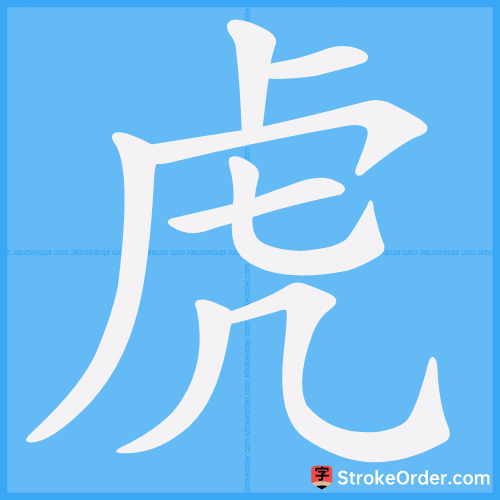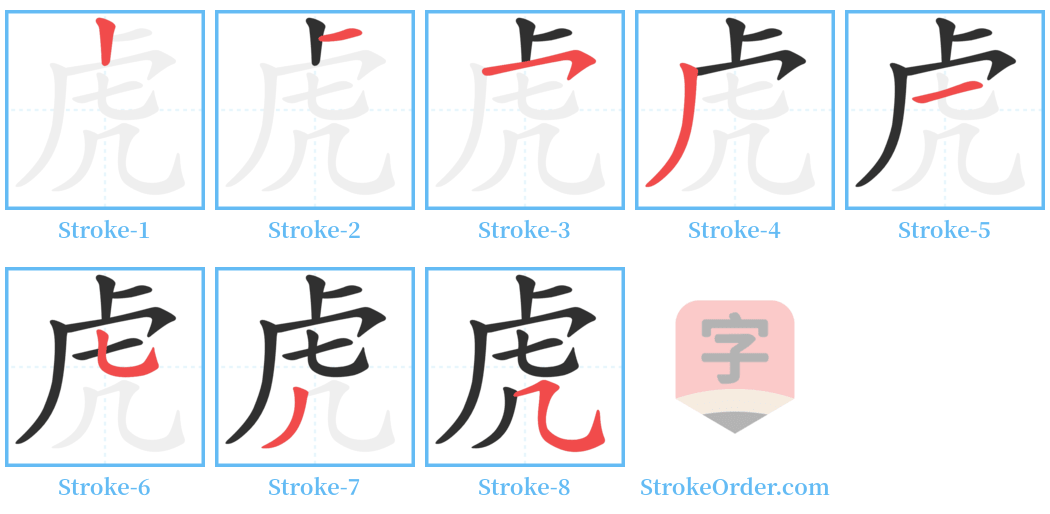虎 Stroke Order
Animated Stroke Order of 虎

Stroke Order Diagrams for 虎

Step-by-Step Handwriting Guide for 虎

Learn to Write Chinese Characters with Video Tutorials
Watch the video of writing the Chinese character "虎", learn the correct stroke order (笔顺) of the character "虎", and master the standard way of writing the character "虎".
Free Printable Handwriting Practice with Stroke Order: 虎
Printable Writing Practice Worksheet of "虎" in Portrait Orientation (Tian Zi Ge)

Printable Writing Practice Worksheet of "虎" in Landscape Orientation (Tian Zi Ge)

Information of 虎
Pinyin
hǔ
Radical
虍
Strokes
8 strokes
Usage
★★★★★
Definition
tiger
虎 [hǔ]
名词
1. A mammal with yellow-brown fur and black stripes, known for its fierce nature and great strength. Its bones, blood, and internal organs can be used in medicine (commonly referred to as "tiger"). Example expressions: 虎口 (metaphor for a dangerous situation; also refers to the point where the thumb and index finger intersect), 虎穴 (metaphor for a dangerous situation), 虎符 (an ancient military token, cast in the shape of a tiger, split in two), 虎狼 (metaphor for a ferocious person), 虎头蛇尾 (leads with confidence but ends ambiguously), 虎踞龙盘 (strong and stable leadership).
2. Brave and powerful: 虎将 (brave general), 虎势 (tiger-like momentum), 虎劲 (strength like a tiger), 虎威 (awe of a tiger), 虎气.
3. An ancient synonym for "唬", meaning to intimidate.
4. An ancient synonym for "琥", meaning amber.
名词
1. Refers to a tiger (Panthera tigris), a large carnivorous mammal native to Asia, characterized by a yellow-brown coat with black stripes, a long tail without tufted hair, mostly white underbelly, no mane, and typically slightly larger than a lion.
2. Any insect that harms other creatures is also called tiger (虎).
3. A surname.
形容词
1. Figuratively refers to being brave.
2. Figuratively refers to being cruel or violent.
动词
1. (Regionally) To suddenly change one's expression to show a harsh or fierce demeanor.
2. To intimidate; also written as "唬".
名词
1. The traditional concept of a tiger, likened to a king of beasts: 《说文》: 虎,山兽之君.
2. References from poetry and historical texts referring to the tiger's ferocity and strength.
例证
1. Expressions: 虎螭 (combination of tiger and dragon), 虎啸 (the roar of a tiger), 虎跃 (a fierce tiger leaping), 虎残 (living on the edge of danger).
2. Insect examples: 蝇虎 (fly tiger), 蝎虎 (scorpion tiger).
名词
1. A surname.
动词
1. To have a sudden change in facial expression indicating hostility.
2. To frighten or intimidate.
另见 hù
Tiger Leaping Gorge on the Jinsha River 金沙江[Jin1 sha1 jiang1] in Lijiang Naxi autonomous county 麗江納西族自治縣|丽江纳西族自治县[Li4 jiang1 Na4 xi1 zu2 Zi4 zhi4 xian4], Yunnan
lit. the fox exploits the tiger's might (idiom); fig. to use powerful connections to intimidate people
tiger tally (a two-piece object made in the shape of a tiger, used in ancient China as proof of authority. One half of a tally could be issued to a military officer and this would be matched with the other half when verification was required.)
the Bocca Tigris, a narrow strait in the Pearl River Delta, Guangdong / Humen Town 虎門鎮|虎门镇[Hu3 men2 Zhen4]
Input Method for 虎
Pinyin
hu3
Wubi
hamv|hwv
Cangjie
yphn
Zhengma
ih
Four Corner
21217
Unicode
U+864e
Same Pronunciation Characters